Fresh off another Buffalo Sabres playoff victory (meaning I’ve had a few beers and am ready for bed), I come bearing bullet points and screencaps!
Quick Hits
- I’ll start at the end with our daring paratrooper who narrowly escaped a watery grave in her crashed helicopter.
Rumor has it her name is Naomi (which I’ll address a little later in this post), and based on the contents of her dislodged backpack, she’s Portuguese. (“Ardil-22” is the Portuguese translation of “Catch-22.”
If you’ll recall, the two researchers/monitors sitting in the arctic station in the 2nd season finale were speaking Portuguese. This, along with the fact that she uttered Desmond’s name before passing out, is undoubtedly proof that Penelope sent Naomi to find Desmond–and seems to have succeeded.
- On a tangential note, the actual English translation of the Portuguese word ardil is “bait” or “luring substance.” Hm. That seems ominous.
- Speaking of that helicopter crash, why exactly did it crash? It certainly wasn’t an EM pulse from the now-defunct Swan Station. Was she just out of fuel? Was she shot out of the sky by an Other anti-aircraft weapon? Maybe she just ran out of fuel. BAH! That last explanation is far too pedestrian (and likely) to be valid on Lost! So, our tally for crashed transports on the island: one slave ship (the Black Rock), a research vessel we’ve yet to see (Rousseau’s ship), a Nigerian drug-running prop plane, a jetliner, Desmond’s sailboat, Henry Gale’s hot air balloon, and a VW bus. Okay, maybe the last one doesn’t count, but any mode of transport within proximity of the place is bound for the scrap heap. (What about the S.S. Other submarine? Locke blew it up, foo’!)
- The episode’s title (“Catch-22”) comes from the popular novel of the same name, published in 1961 and written by Joseph Heller. I leave it to Wikipedia’s ever-amazing literary wizardry to elaborate:
Catch-22 is a term, coined by Joseph Heller in his novel Catch-22, describing a general situation in which an individual has to accomplish two actions, both of which are dependent on the completion of the other. A familiar example of this circumstance occurs in the context of job searching. In moving from school to a career, one may encounter a Catch-22 where one cannot get a job without work experience, but one cannot gain experience without a job. Catch-22 situations are also sometimes called the chicken or the egg problems.
It’s not difficult to extrapolate the concept to Desmond trying to keep Charlie alive whilst successfully reaching Penelope/the paratrooper, two goals seemingly at odds with each other at episode’s open.
- Remember Ms. Hawking, the enigmatic jewelry store owner, from back in Desmond’s last flashback episode? Inexplicably, she makes an appearance in a badly-photoshopped picture sitting on the desk of Desmond’s monk superior.
Her role in that episode was largely as Desmond’s guide through his past while forcing him toward his inevitable and unchanging fate. Her appearance in the photograph is a reminder of that fact, particularly in light of the fact that his being expelled from the monkly order directly led to his hook-up with Penelope and eventually to the island. I don’t think we’ve seen the last of her, but who knows what her presence in that photograph may mean in the literal sense? Does her being the head monk’s mother or sister or wife have any real bearing on the story? Well, if she forced the head monk to expel Desmond from the order, mayhap so!
- In what was likely be the most important yet overlooked revelation of the week, it was revealed that Bernard (remember him and Rose?) is a big Phil Collins fan, and there’s gonna be hell to pay when he finds out Sawyer stole his Greatest Hits tape to give to Kate. This confrontation has season finale cliffhanger written all over it.
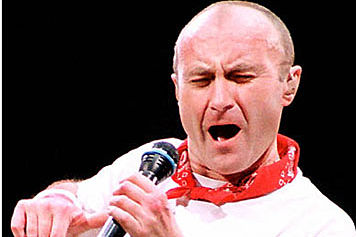
My favorite line of the episode, by the way: “Do you need me to make ya a mix tape?”
- Among the most religion-heavy episodes of Lost in recent memory. The biblical story of Abraham and the near-sacrifice of his son figured largely in painting the broad strokes of Desmond’s motivation in willingly sacrificing Charlie in order to find Penelope. Of course, just like Abraham, Desmond ended up not having to make that sacrifice.
Some time after the birth of Isaac, Abraham was commanded by God to offer his son up as a sacrifice in the land of Moriah [the wine the monks made came from the “Moriah Vineyards”]. The patriarch traveled three days until he came to the mount that God showed him. He commanded the servant to remain while he and Isaac proceeded alone to the mountain, Isaac carrying the wood upon which he would be sacrificed. Along the way, Isaac repeatedly asked Abraham where the animal for the burnt offering was. Abraham then replied that God would provide one. Just as Abraham was about to sacrifice his son, he was prevented by an angel, and given on that spot a ram which he sacrificed in place of his son. Thus it is said, “On the mountain the Lord provides.” (Genesis 22) As a reward for his obedience he received another promise of a numerous seed and abundant prosperity (22). After this event, Abraham did not return to Hebron, Sarah’s encampment, but instead went to Beersheba, Keturah’s encampment, and it is to Beersheba that Abraham’s servant brought Rebekah, Isaac’s patrilineal parallel cousin who became his wife. [Wikipedia]
- I promised some discussion on Naomi’s name, and while I’m at it, I’ll tackle Ruth, Desmond’s jilted ex-fiancee.
The book of Ruth is about an ordinary family who found themselves in extraordinary circumstances. Elimelech moves his two sons and wife Naomi from Bethlehem, Judah to Moab during a time of famine. Their two sons marry Moabite women Orpah and Ruth (Ruth רוּת means “Compassion”, Standard Hebrew Rut, Tiberian Hebrew Rûṯ). Over a period of ten years, the men of the family die, leaving their three widows. Naomi resolves to return to her homeland and urges her two daughters-in-law to return to their Moabite families. Orpah listens to Naomi’s urgings, but Ruth pledges her undying devotion to her mother-in-law (Ruth 1:16-17). Naomi and Ruth return to Bethlehem during the time of the barley harvest.
In order to provide food for the two women, Ruth receives permission to glean in the fields of Boaz, Naomi’s kinsman. Naomi sends Ruth to ask protection from Boaz, who is a close relative. Boaz is attracted to Ruth, but informs her that there is a closer kinsman who has the first right to redeem the estate of Elimelech. It is necessary for the closer kinsman to renounce his right before Boaz can proceed in the matter. Accordingly, Boaz meets with the closer kinsman and tells the kinsman of his right to redeem the estate and to marry Ruth. The kinsman does not want to marry Ruth, nor would he want to yield Elimelech’s property back to a child born from the union. The closer kinsman takes off his shoe and hands it to Boaz which was the ritual way of showing that he waived his right to Elimelech’s property.
Boaz follows through on a plan to grant security (redemption) to the two women. Boaz marries Ruth and their child, Obed, is “born to Naomi†(Ruth 4:17) which indicates that Elimelech’s line is continued and Naomi is blessed by Obed’s birth. The genealogy that concludes the book of Ruth climaxes with the wonderful disclosure that Ruth of Moab is the great-grandmother of King David. [Wikipedia]
Other Stuff from Other Sites
- The tune the four musketeers were whistling was “The Colonel Bogey March,” from Bridge on the River Kwai.
- I couldn’t make out what book Sawyer was reading before sexy time this week, so off to Sledgeweb’s I go:
…well, nevermind. It’s 1:30 in the morning and I haven’t found out what the book was, so good night for now.
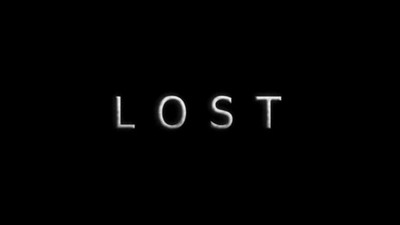
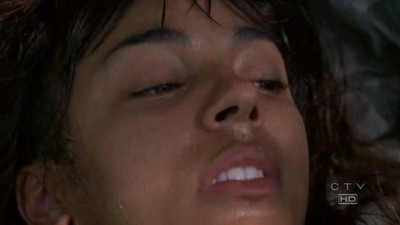
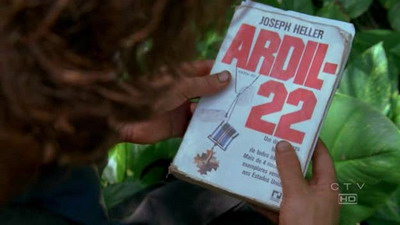
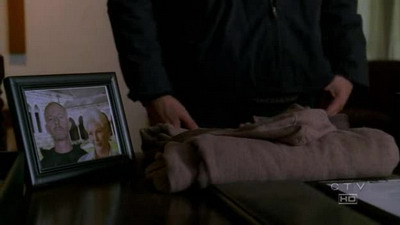

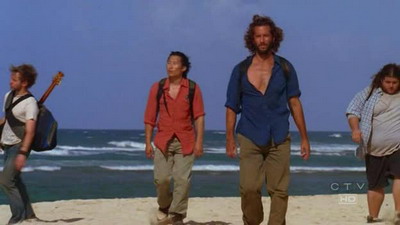
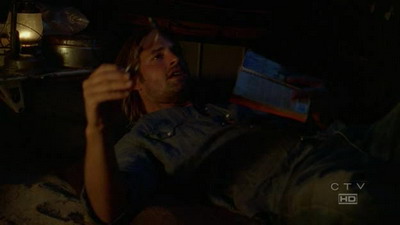
I realize this years late, but just came across your page here and wondered if you ever found out what Sawyer was reading there in the tent before being raped by Kate.